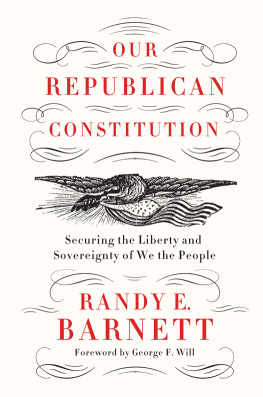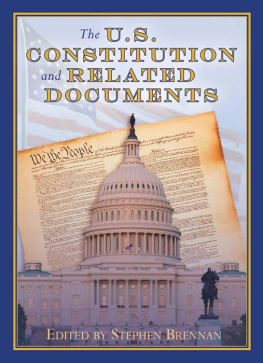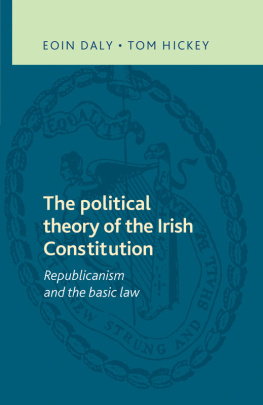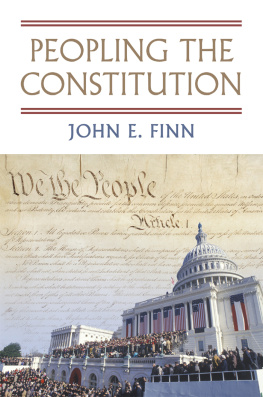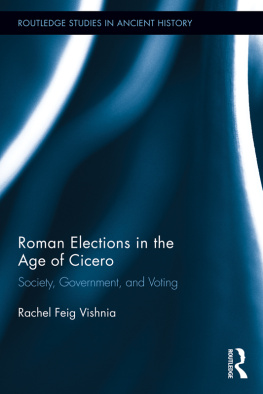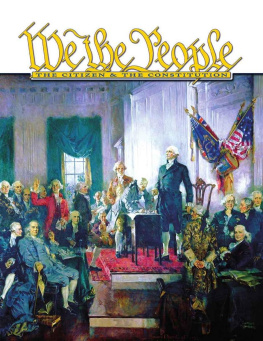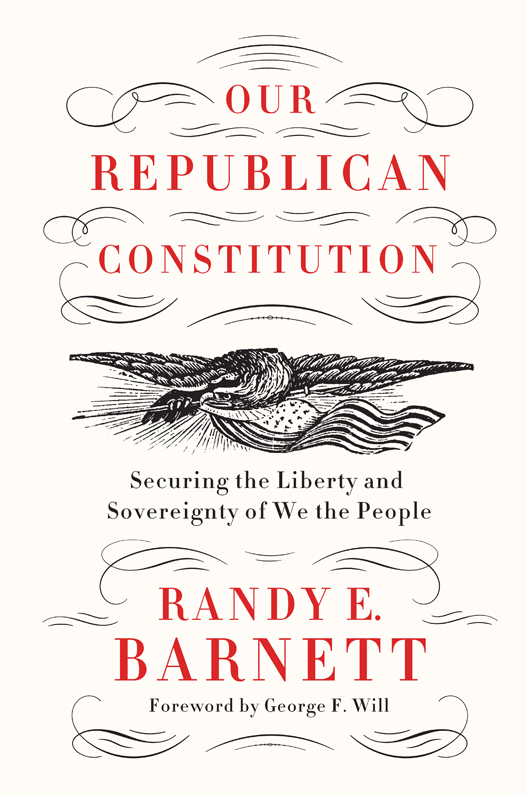CONTENTS
Guide
Australia
HarperCollins Publishers Australia Pty. Ltd.
Level 13, 201 Elizabeth Street
Sydney, NSW 2000, Australia
www.harpercollins.com.au
Canada
HarperCollins Canada
2 Bloor Street East - 20th Floor
Toronto, ON M4W 1A8, Canada
www.harpercollins.ca
New Zealand
HarperCollins Publishers New Zealand
Unit D1, 63 Apollo Drive
Rosedale 0632
Auckland, New Zealand
www.harpercollins.co.nz
United Kingdom
HarperCollins Publishers Ltd.
1 London Bridge Street
London SE1 9GF, UK
www.harpercollins.co.uk
United States
HarperCollins Publishers Inc.
195 Broadway
New York, NY 10007
www.harpercollins.com
Restoring the Lost Constitution
The Structure of Liberty
The Rights Retained by the People
OUR REPUBLICAN CONSTITUTION. Copyright 2016 by Randy E. Barnett. All rights reserved under International and Pan-American Copyright Conventions. By payment of the required fees, you have been granted the nonexclusive, nontransferable right to access and read the text of this e-book on-screen. No part of this text may be reproduced, transmitted, downloaded, decompiled, reverse-engineered, or stored in or introduced into any information storage and retrieval system, in any form or by any means, whether electronic or mechanical, now known or hereafter invented, without the express written permission of HarperCollins e-books.
Broadside Books and the Broadside logo are trademarks of HarperCollins Publishers.
FIRST EDITION
ISBN: 978-0-06-241228-7
EPub Edition April 2016 ISBN 9780062412300
16 17 18 19 20 OV/RRD 10 9 8 7 6 5 4 3 2 1
TO MY FATHER,
RONALD EVAN BARNETT
(19262015),
a true republican
THIS BOOK, SLENDER and sharp as a stiletto, arrives at a moment when the nations civic temperature is high, but not higher than the stakes of todays political argument. This volume is written by a law professor and lucidly takes readers into the thickets of jurisprudential controversies. It is not, however, merely, or even primarily, a book about American constitutional law. In fact, it demonstrates why any treatise on the major themes of constitutional law cannot help but be much more than that. It must be an encounter with the great issues of political philosophyhow to understand human nature, rights, freedom, equality, and justice. Or in Randy Barnetts formulation, How should society be structured so that individuals can pursue happiness while living in close proximity to others?
In the pages that follow, Barnett explains why the way we resolve two of todays interlocking argumentsabout the Constitutions priorities and the judiciarys role in implementing themwill decide nothing less than the nature of the American regime.
Barnett is an eminent law professor and the prolific author of now eleven books and scores of law review articles pertaining to constitutional law. Also, through his engagement in public affairsarguing in appellate courts and the Supreme Court, in the mass media and other public forumshe has become one of the nations most prominent public intellectuals. Now however, in this book, he explicitly assumes a role implicit in his other roles, that of political philosopher.
His career, and this book, illustrate a profound truth about the American polity and its history, a truth sometimes missed by even the most accomplished students of American history. It is often said that ours is a nation indifferent, even averse, to political philosophy. And it is said that this disposition is a virtue and a sign of national health. The theory is that only unhappy nations are constantly engaged in arguing about fundamental things, and that the paucityone should say the postulated paucityof American political philosophy is evidence of a contented consensus about our politys basic premises.
More than six decades ago, Daniel J. Boorstin, then a University of Chicago professor of American history and later librarian of Congress, published his own slender volume, The Genius of American Politics. It appeared in 1953, during Americas postwar introspection about the nature and meaning of our nations sudden global preeminence. Boorstins argument, made with his characteristic verve and erudition, aimed to explain why our success was related to our antipathy to political theory.
The genius of our democracy, said Boorstin, comes not from any geniuses of political thought comparable to Plato and Aristotle or Hobbes and Locke. Rather, it comes from the unprecedented opportunities of this continent and from a peculiar and unrepeatable combination of historical circumstances. This explains our inability to make a philosophy of them, and why our nation has never produced a political philosopher of the stature of, say, Hobbes and Locke or a systematic theoretical work to rank with theirs.
Well. Leave aside the fact that James Madison was a political philosopher of such stature. He was because he was a practicing politician. And leave aside the fact that, which it surely is, The Federalist Papers, although a compendium of newspaper columns written in haste to solve a practical problem (to secure ratification of the Constitution), is a theoretical work that ranks with Hobbess Leviathan and Lockes The Second Treatise on Civil Government. Indeed, The Federalist Papers remains a recognizably major event in the Western political conversation begun by Plato.
Considered in the second decade of the twenty-first century, as we stand on the dark and bloody ground of todays political contentions, Boorstins book remains interesting, but primarily as a period piece. It is a shard of Americas now-shattered consensus. Or, more precisely, it is a document from the calm before the storm of the counterattack against progressivisms complacent assumption that its ascendancy was unchallenged and secure.
The theory that America is inhospitable to political philosophy is thoroughly wrong. The American argument about philosophic fundamentals is not only ongoing, it is thoroughly woven into the fabric of our public life. Far from being rare and of marginal importance in America, political philosophy is more central to our public life than to that of any other nation. It is implicated in almost all American policy debates of any consequence.
Indeed it is, like Edgar Allan Poes purloined letter, hidden in plain sight. All American political arguments involve, at bottom, interpretations of the Declaration of Independence and of the Constitution, which was written to provide institutional architecture for governance according to the Declarations precepts. So constitutional lawyers like Barnett are Americas practitioners of political philosophy.
The Constitution, which Barnett calls the law that governs those who govern us, is, he argues, properly read in the bright light cast by the great document that preceded it, the Declaration of Independence. The Constitution was written to provide the institutional architecture and the practices requisite for a national life lived in accordance with what Barnett calls Jeffersons fifty-five compelling words:
We hold these truths to be self-evident, that all men are created equal, that they are endowed by their Creator with certain unalienable Rights, that among these are Life, Liberty and the pursuit of Happiness. That to secure these rights, Governments are instituted among Men, deriving their just powers

